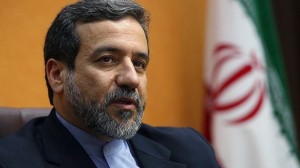[caption id="attachment_53358" align="alignright" width="180"] Iran Deputy Foreign Minister for Legal And International Affairs Abbas Araqchi[/caption]
Iran Deputy Foreign Minister for Legal And International Affairs Abbas Araqchi[/caption]
The bilateral talks at the U.N.'s Palais des Nations last for an hour and signal further easing of tension in the dispute over Iran's nuclear program.
GENEVA — Iranian diplomats Tuesday laid out a plan to address international concern about their nation's nuclear program and held a rare private meeting with their U.S. counterparts as two days of talks between Iran and six world powers got underway at a United Nations palace.
In another sign of easing tension between their nations, Undersecretary of State Wendy Sherman and other Americans met for an hour with Iranians led by Deputy Foreign Minister Abbas Araghchi at the U.N.'s Palais des Nations. It was only the second such U.S.-Iranian bilateral meeting in seven years of diplomatic efforts to resolve the conflict over Iran's nuclear program.
The meeting capped a day that began with Iranian Foreign Minister Mohammad Javad Zarif laying out, in an hourlong English-language PowerPoint presentation, a plan to resolve the 2-decade-old dispute. Zarif's title for the presentation suggested his goal: "Closing an Unnecessary Crisis — Opening New Horizons."
U.S. officials said in a statement that the evening meeting was "useful" though "expected," in light of Secretary of StateJohn F. Kerry's private meeting with Zarif last month on the sidelines of the U.N.'s annual meeting in New York.
The diplomacy began amid high expectations because of two months of overtures between the United States and Iran, which have stirred speculation that the two countries may be ready to solve the dispute and repair their relationship. On Sept. 27, President Obama broke three decades' precedent by speaking to Iranian President Hassan Rouhani by telephone.
Yet though U.S. officials praised the Iranians for their willingness to delve into technical details, it was not clear that the Iranian delegation had given the Americans what they wanted to hear about curbing the nuclear program. Zarif and Araghchi spoke mostly in broad terms about their goals, diplomats said.
In the last decade of international meetings on the nuclear program, the Iranians have often not shown their hand until the final hours, analysts noted.
Iranian officials, who are eager to ease sanctions on their economy, have in recent days promised to present a broad "road map" that would chart the path to a resolution of the dispute over its program, which many nations fear is aimed at developing a nuclear weapons capability. Iranian officials have said in private meetings that they would agree to stop production of medium-enriched uranium, which is of special concern to the West because it is easily converted into nuclear bomb fuel, and to allow for international inspection of nuclear sites.
Iranian officials made no public comment Tuesday about the contents of their plan. But in interviews with his nation's state-controlled media, Araghchi emphasized that Iran intends to maintain its vast nuclear complex, which is a source national pride.
In interviews with the Islamic Republic News Agency and the Iranian Students News Agency, Araghchi said Iran intends to continue operating the disputed Fordow and Natanz enrichment plants, and will insist that world powers recognize Iran's "right" to enrichment.
He said Iran will cooperate with the United Nations on the nuclear program and other issues. But he didn't mention a halt in the production of medium-enriched uranium, or a decision to send the existing stockpile of the material out of the country, as the West has urged.
He said that the Iranian religious directive, or fatwa, against the use of nuclear weapons would be sufficient to build the world's confidence that Iran intended its nuclear activities to be peaceful.
Ray Takeyh, an Iran specialist at the Council on Foreign Relations, said that, in the accounts, "I don't see anything shutting or being shipped out. If that's still our red line, then presumably this falls below it." But he acknowledged that it was not possible to draw conclusions about Iran's intentions based on the sketchy information on the talks available so far.
U.S. officials have sought to play down expectations for the meetings, saying that a breakthrough was unlikely to come quickly on such a complicated issue. In comments to reporters, Araghchi also was unwilling to say that progress had yet been made.
Negotiators for the seven countries — Britain, France, Germany, Russia and China, in addition to the U.S. and Iran — will meet again Wednesday. Iranian officials have suggested that they might meet several additional times at a more senior level in the weeks ahead.
Catherine Ashton, who is the European Union's foreign policy chief and point person for the six major powers, met privately Tuesday evening with Zarif.
By Los Angeles Times
The Iran Project is not responsible for the content of quoted articles.

 QR code
QR code